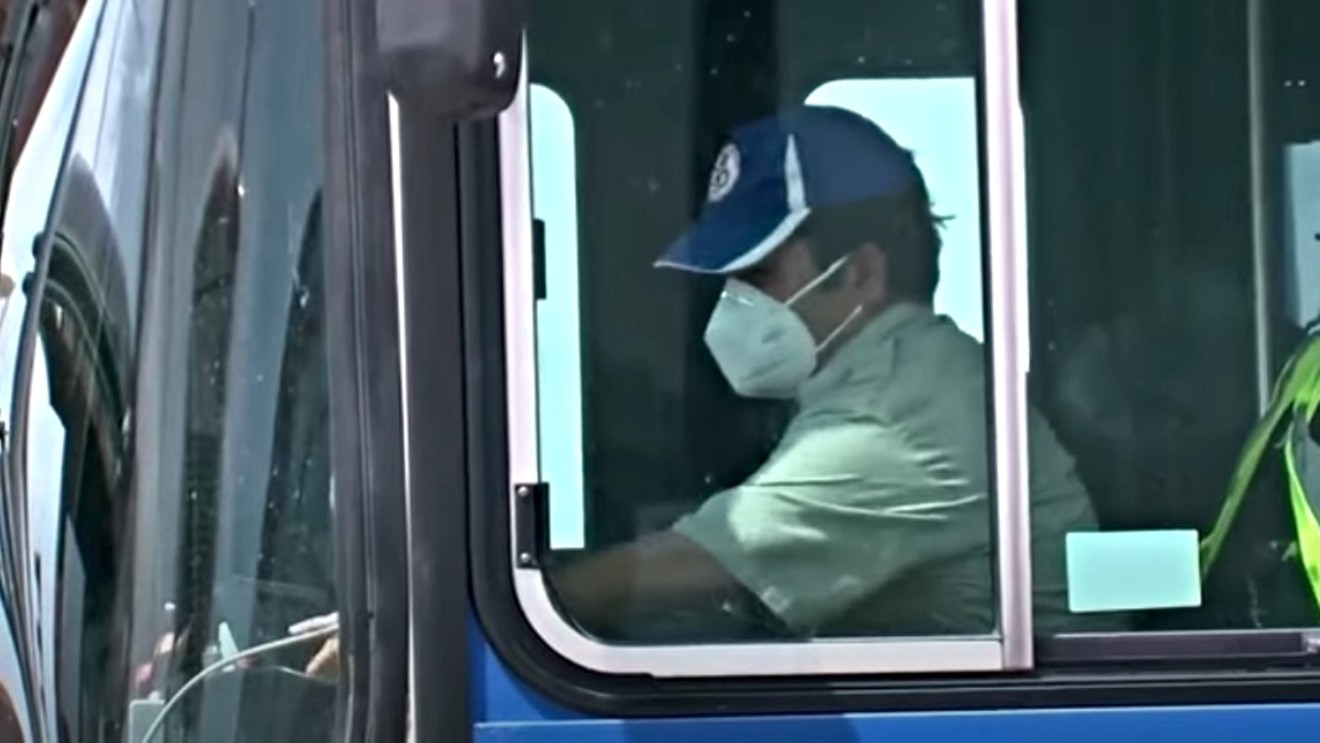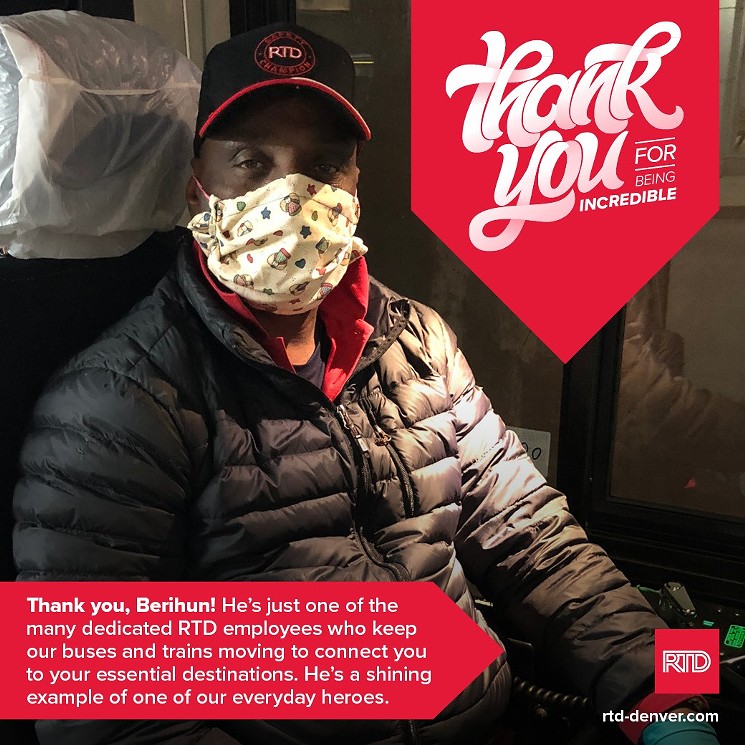One regular RTD rider we know has collected a catalogue of horror stories. During a trip last week, when a man wearing a mask on his chin sat right next to her, she asked him to please readjust the covering and move to create at least a six-foot gap between them. He responded by yelling that she was a "white bitch" — which is enormously offensive but also sort of amusing, since she isn't white or a bitch.
The driver didn't respond to the outburst, so she stepped past the man to another, more distant seat, and then had to call RTD security herself. But it's not uncommon for RTD drivers to keep their eyes on the road. According to RTD spokesperson Tina Jaquez: "Our drivers are instructed to focus on operating the vehicle. We will not put our operators in the position of being enforcers when they need to be focused on moving people safely."
When we shared other examples of the woman's experiences — all collected while riding Route 9 (West Tenth Avenue) and Route 16 (West Colfax Avenue) — with Jaquez and RTD communications assistant manager Pauletta Tonilas, their answers made it clear that RTD's procedures are heavily weighted toward good choices by passengers. As Jaquez puts it, "Our hope is that everyone will make it their personal responsibility to follow orders and protocols and be our partners in safety."
Of course, RTD is dealing with lots of challenges right now. Even before the pandemic hit, the agency was besieged by budget cuts, driver shortages and declining ridership. Since March, Streetsblog Denver notes, RTD has cut service in the eight counties it serves by 40 percent, impacting "95,793 riders and 39,535 job holders who would lose access to frequent full-day access. This includes 6,486 households who do not have access to a vehicle and rely on public transportation to go to work, get groceries, get to medical appointments, and more."
Our source is in just such a situation — and as a result, she's had many opportunities to observe Denver-area bus travel in the age of COVID-19. She says recorded announcements about mask-wearing and social distancing that had been triggered every time a new passenger stepped aboard a bus stopped a couple of weeks ago — but even when they were sounding regularly, a significant percentage of passengers paid little attention.
Passengers continue to get rides even if they aren't wearing a mask, our source adds. In one recent incident, she watched as four young men with uncovered faces boarded simultaneously and sat in close proximity to others. The woman relocated rather than confronting them — but such options are limited given capacity limits that are said to be often exceeded. On her routes, the passenger total is generally kept at ten, but not always. And compliance with both mask use and social distancing tends to worsen later in the day and especially on Fridays, when some passengers have already started partying.
As for enforcement of rules, it apparently ranges from infrequent to nonexistent. One driver told her that he'd been disciplined for asking an elderly woman to pull up her facial covering when the latter reacted angrily. Jaquez says she has no information about such an incident.
According to Jaquez, recorded announcements are still being played every time doors open at stops, and she notes that "our operators also have the ability to push canned messages regarding mask announcements." Furthermore, she says, "our buses have signage regarding mask requirements on the door, and social distancing signage is also posted inside our buses."
As for space invasions, Jaquez emphasizes that "we have asked our passengers to voluntarily observe and comply with social distancing requirements. Currently, reports from staff and visual field observations indicate that there is a high level of voluntarily compliance on our services. We do not want our operators to be in a position where enforcement leads to an operator assault or disruption in services. We have methods for our passengers in place for reporting incidents through our Transit Watch program, which includes an app."
In regard to current bus limits, Jaquez stresses that "RTD operators make every effort to watch passenger loads." If passenger counts of fifteen passengers on thirty- and forty-foot buses and twenty passengers on articulated and intercity coaches are exceeded, bus drivers are asked to:
• Report to dispatch when counts are reached based upon the appropriate coach size load.•"Our operators make every effort to monitor passenger loads, but with people boarding and alighting at various locations, it is sometimes difficult to monitor," Jaquez acknowledges. "We ask our passengers to be our partners in safety by determining whether or not they want to enter a bus based on the load, and we ask that they be responsible for practicing social distancing and wearing a mask."
• Put bus signage “bus full” using the appropriate code, but being aware the bus full sign will not change until end of line.
• Resume picking up passengers when onboard counts fall below guidance above.
• Continue to honor stop requests. Do not attempt to keep individuals from boarding if the count for the type of bus is reached during drop-off.
• If the wheelchair securement area is available, drivers will stop to board a passenger in a mobility aid.
For RTD, she maintains, "safety is our core value, and it is especially important during this pandemic. To ensure our passengers are safe, in addition to encouraging social distancing we do the following: daily sanitation of vehicles with electrostatic sprayers; installation of polycarbonate driver shields, to provide a protective barrier between operators and customers; daily wellness check of employees; and requiring masks of all employees and customers; have ongoing coordination with local health authorities. But as mentioned, we ask that our customers be our partners in safety by using good judgment about social distancing, practicing proper hand hygiene and by wearing a mask."
Meanwhile, Tonilas notes that "numerous studies have been done across the world resulting in a growing body of research that riding transit is very safe. This is largely because transit riders largely respect health and safety protocols — wearing masks, spreading out on buses and trains, not talking while riding. Plus, the air flow on buses and trains is constant, and most transit trips aren’t very long."
Customers with complaints are encouraged to have the bus number and time of the incident handy when contacting RTD. Click for more information about RTD Transit Watch.













